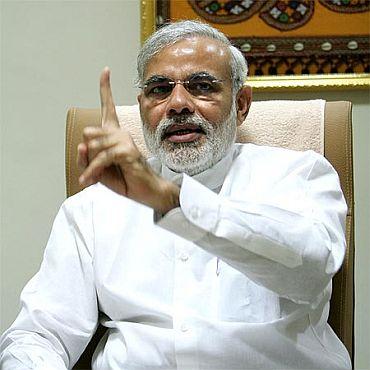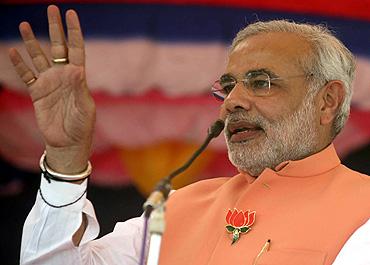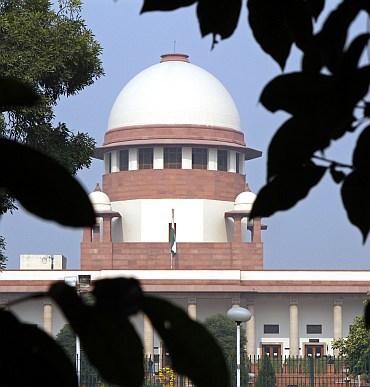
The much awaited verdict on Chief Minister Narendra Modi's alleged involvement in the 2002 Gujarat riots has been deferred.
The Supreme Court on Monday directed the Special Investigation Team probing Modi's role in the riots to submit its final report before a trial court.
The apex court was acting on the plea of petitioner Zakia Jafri, whose husband and former member of Parliament Ehsan Jafri was brutally killed during the riots in Gulburg society, Ahmedabad. The court had appointed a Special Investigation Team to probe Modi's role in the riots.
The SC was expected to decide on Monday if any further probe against Modi is required.
The trial court will now decide on Jafri's plea in accordance with the law.
Reportage: Onkar Singh in Delhi

In her petition, Zakia had named Modi and 62 others. She had alleged that Modi and his associates orchestrated the communal riots in 2002, which erupted after the Godhra train carnage, in connivance with police officials and senior bureaucrats.
The apex court refused to pass an order on the alleged inaction of Modi during the 2002 riots and referred the matter to the magistrate concerned in Ahmedabad.
"We are monitoring the case," the apex court said.
Though Jafri had personally telephoned Modi, urging him to take action to save the lives of the residents of Gulbarg Society, the Gujarat chief minister refused to do so during the 2002 riots, Zakia had alleged in her petition.
A special bench comprising justices D K Jain, P Sathasivam and Aftab Alam passed the direction on the basis of a confidential report submitted by amicus curiae Raju Ramachandran on the investigation carried out by the SIT.

The apex court, in its order, said that if the SIT wants to close its case against any person named in the petition then Zakia Jafri should be notified about it and she can approach the court for justice.
The report was prepared and submitted by Ramachandran, who is assisting the bench in nine riot cases on the direction of the apex court, which had on May 5 sought an "independent overview" of the evidence recorded by the SIT.
The senior advocate prepared the report after visiting Ahmedabad and talking to many people, including witnesses and police officers.
In February, the SIT team headed by former Central Bureau of Investigation Chief RK Radhavan submitted a 600-page report in a sealed envelope to the Supreme Court.
News channel CNN-IBN and Tehelka magazine had accessed its details. The report posed several embarrassing questions for Modi, but stated that the evidence was not strong enough to prosecute him.

According to the SIT report:
The government's reaction to the violent attacks on Muslims in Gulburg Society and Naroda Patiya in Ahmedabad was not up to expectations.
Chief Minister Narendra Modi tried to water down the seriousness of the situation at Gulburg society and Naroda Patiya by saying every action has an equal and opposite reaction.
The report also criticised Modi for appointing pro-Vishwa Hindu Parishad advocates as public prosecutors in the riot cases.
Modi had not visited riot-affected areas though he was at Godhra on February 27, 2002.
The government destroyed wireless records of police conversations on that fateful day.
The report also criticised the role of bureaucrats and cabinet ministers.
But the report failed to satisfy the apex court, which then asked amicus curie Raju Ramachandran to see if there were any lapses in the SIT report and suggest the future course of action.